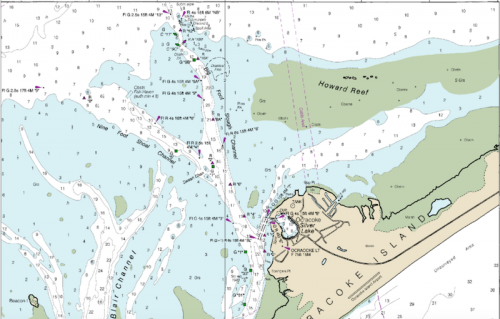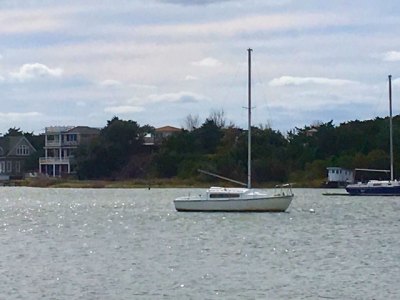Dredging & Dereliction Discussed at Waterways Meeting

The Swan Quarter and Cedar Island ferry routes depend on the channel. Dredging will begin in the first quarter of 2018, said Jim Matlock of the US Army Corp of Engineers.
A shoal has been encroaching on Big Foot since June, said NCDOT Supervisor Chris Bock. The Sea Level ferry bumped aground late last week; $15,000 worth of repairs are required. Bock affirmed the Ferry Division's commitment to maintaining a "safe and open" channel, though he could not promise that winter winds won't cause additional shoaling before dredging begins.
"We're going to keep running as long as it's safe," said Bock.
Maintaining navigable passages to and from Ocracoke is one mission of the newly-formed Ocracoke Waterways Commission.
Representatives from NCDOT Ferry Divison, NC Wildlife Resources Commission, the National Park Service, US Army Corps of Engineers, Dare County Waterways Commission, and the Hyde Board of Commission joined the appointed, volunteer board consisting of Ocracoke Island business owners and commercial fishermen. The board expressed hope that the Hyde Sheriffs Department and US Coast Guard would be able to participate in future meetings.
Inter-agency communication and cooperation is vital to getting anything done. The Corps of Engineers performs hydrographic surveys and identifies "hot spots" that require dredging. The Corps has the sidecaster and hopper dredges which do the work, and the Corps also awards contracts to private dredge operators. The USCG places, moves and maintains navigational aids. State and federal agencies responsible for environmental oversight often must approve the plans. The NCDOT maintains the ferries, and sometimes must alter their schedules to allow for dredging. Whew! All these people in offices from Washington, DC to Wilmington, NC working to keep a flow of people and products arriving on the sandy shores of our little island, where many people aren't big fans of big government.
"These waterways are our economy. We have no road," said David Hilton, Ocracoke Waterways Commission Chair, a commercial fisherman, and former NC Fisheries Commissioner.
Dredging funds which once came from the federal budget have dried up, and in 2014 the NC General Assembly approved a Memorandum of Agreement with the Corps of Engineers requiring that local municipalities fund 25% of dredging projects. Hyde and Dare have been working in partnership since 2015 to fund dredging of the new, slithering Hatteras ferry channel.
The old ferry cruised along Rollinson channel, which was first designated a federal channel in 1935. Once at least 100 foot wide and 12 foot deep, the stretch of Rollinson channel that hugged the southernmost end of Hatteras is now unnavigable for the modern boater, would be unrecognizable to a seaman who time-traveled from the last century, and is unlikely to be a candidate for federally funded dredging anytime soon.
Part of the original legislation called for captains to "follow best water," said Steve "Creature" Coulter, a member of the Dare Waterways Commission, who rode the ferry over and back to help inaugurate the first non-organizational meeting of the Ocracoke working group.
Wisdom gleaned from time on the Dare board? "Got a federal channel? Keep 'em working on it," said Coulter.
(Big Foot slough is included as part of the Silver Lake Harbor Act, first passed by the US Congress in 1930 and last amended in 1967.)
"We want to keep our neighbors working," said Coulter, captain of the charter boat Sea Creature. "You have to work together. It's not easy. Figure it out. Stay on it." Agencies one has never heard of can pop up and impede the progress of projects, said Coulter.
Less than 1% of funds for federally designated channels goes to shallow draft inlets. Does one even need write it? All of the waterways around Ocracoke are shallow draft inlets.

Future thought processes should involve thinking about money from Hyde and local sources, so that matching funds from state and federal agencies will be available, said Matlock, who teleconferenced from the Corps of Engineers office in Wilmington. The Corps can provide cost estimates for projects, he said.
In future meetings, the Ocracoke Waterways Commission will continue to educate itself, and explore options for a shorter ferry route between Hatteras and Ocracoke.
The second half of the two hour plus meeting was devoted to the question of what can be done about derelict boats in Silver Lake harbor. The board will begin gathering public comment over the winter.
Several vessels are left untended in Silver Lake for much or all of the year. They have caused damage to neighboring docks and other boats when they slip anchor. Civil suits are one recourse for people whose property has been damaged, but many of the boats do not have clear ownership, and suing someone who lives on a $500 sailboat may not be remunerative.
At the October 16 meeting, Robert Wayne of the NC Wildlife Resources Commission spoke about his duties. NCWRC enforces hunting, trapping, and boating laws in NC, said Wayne. The USCG is better equipped to handle discharge violations, though the WRC can issue a citation if an officer witnesses a discharge of sewage.
A vessel at dock or anchor does not have to be registered, said Wayne, leaving his agency with few options for enforcement. Hyde could pass an ordinance requiring anchored boats to have valid registration. Hanover and New Brunswick Counties recently took that step. Beaufort is discussing the same topic of derelict boats, said Hyde County Manager Bill Rich, who has heard from weekend cruisers "up and down the coast" that Ocracoke is a less attractive anchorage because of derelict drifters.
The number of haphazardly tended boats in the harbor is "affecting cruising dollars," said Rich.
NPS imposes a 14-day limit on using its dock, and the Waterways Commission could consider a limit on anchoring in the harbor, insisting that vessels periodically leave, and therefore be seaworthy and registered.
Timothy Wilkinson has been living on the hook in Silver Lake since mid-summer. A cruising boater taking a long sojourn on the island, Wilkinson attended his first-ever community meeting on Ocracoke, and was impressed with the turnout (roughly 1% of island residents were present at the meeting). He acknowledged that there is an issue with largely untended boats in the harbor, saying it is "worse here than many places."
When the wind blows, "it's a pinball machine out there," said Wilkinson. There appear to be five boats at anchor with no skipper whatsoever, said Wilkinson, who said he is often alone in displaying an anchor light.
Shane Bryan of NPS recently returned home after 26 days assisting with Hurricane Maria clean-up in Florida. Derelict boats there rammed and sank multiple vessels, and ended up in critical habitat areas in marine sanctuaries, said Bryan.
Bryan has been responsible for the removal of at least one boat that sank at the NPS docks. Getting a boat declared abandoned and receiving permission to destroy it was a "long process," that involved a federal court order, and then a front end loader.
It is always cheaper and easier to handle abandoned boats "before they go down," said WRC Officer Wayne. The county could have them declared abandoned, assume ownership, and remove the vessels, but the county would have to find the funds.
Wayne said one of his roles is "knocking on doors and educating people." He is willing to tap on hulls and encourage live-aboards to lawfully dispose of discharge and display proper lights.
"That could go a long way," said Ocracoke Commissioner Tom Pahl.
Wayne would like to offer a boater safety class on the island in the near future, and asked the Waterways Commission for help in publicizing the event.
Vince O'Neal serves on both the Waterways Commission and the Planning Board. It may be appropriate for the two boards to work together to host a conversation about the regulatory future of Silver Lake. What do we value about the harbor? Who uses it, and how? What on shore services – a dinghy dock? a toilet facility? – could be offered to visiting boaters? What expectations should the community have of those living in the harbor?
At this writing, it is unclear which advisory panel is responsible for recommendations regarding Silver Lake. The law enforcement agencies that interact in the harbor will also need to be part of the conversation, noted one commission member.
The public should know "the conversation about the harbor is happening," said Waterways Commission Chair Hilton. He said the board is in a "learning phase," gathering information, and "welcoming comment." At this point, they are unbiased, said Hilton, and seeking solutions.
To join the conversation, attend the next Waterways Commission meeting, November 20, at 5:30 pm at the Community Center.



